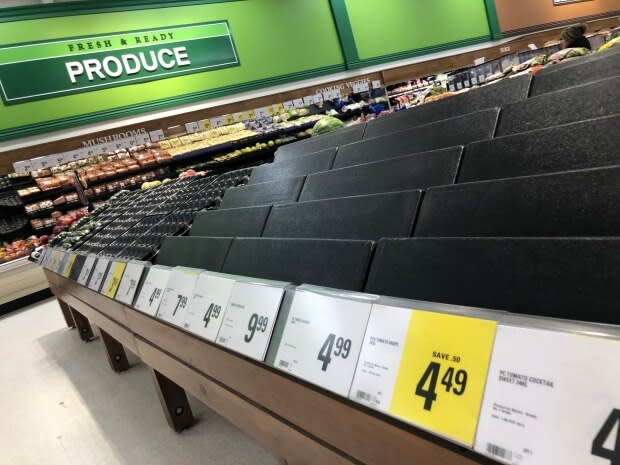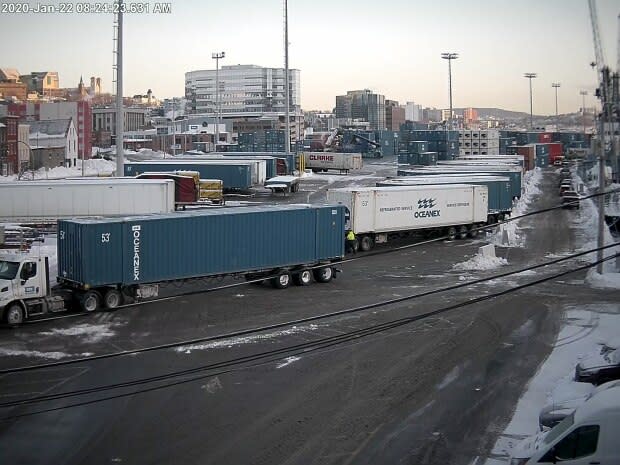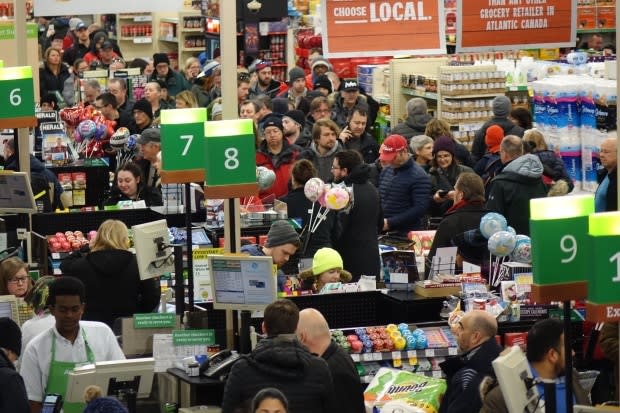St. John's storm causes empty shelves in grocery stores in central Newfoundland
If you're noticing slim pickings at stores in central Newfoundland, it's probably because of the blizzard that has shut down St. John's for the past six days.
Dominion posted signs around its locations in Grand Falls-Windsor and Gander earlier this week, saying the state of emergency in the capital city was causing product shortages.
"We are doing our very best to deliver the best experience possible given these circumstances," the signs read.
More than 300 kilometres away, several containers of goods destined for grocery stores are still sitting at the Oceanex dock in St. John's after three cargo ships docks during the state of emergency.
It's not necessarily the cause of the shortages in central Newfoundland, since 80 per cent of Oceanex's business is in the St. John's metro region, but it is indicative of the challenges in shipping produce after the storm.

Oceanex was given essential service status, and began loading trucks Tuesday afternoon despite the state of emergency prohibiting most vehicles from being on the road.
CEO Sid Hynes said the situation is getting better by the day, but the backlog of shipments since Friday has caused delays.
"We have major customers, large customers and until they are able to receive their freight, they're asking us to hold it," Hynes told Newfoundland Morning.

In St. John's, food supply was said to be in good shape when stores opened for the first time Tuesday, since most grocery store's distribution centres were well-stocked.
They were unable to get trucks out to stores outside the Avalon, however.
Erin Higdon of Atlantic Grocery Distributors said her company is used to weather delays, but this was beyond anything they'd faced before.
"There is no doubt with the volume of business that we do that some of those containers [at Oceanex] belong to us, and we're trying to work on the best plan to get them here and out to the customers who need them," she said.
Higdon said they were working on getting back to normal. Both she and Hynes warned it could take a few days.
What can be learned?
The storm has been a lesson in food security for the island, said Josh Smee, CEO of the non-profit group Food First NL.
It showed the ripple effect when one of the few commercial ports in the province is shut down for days at a time.
"It really does echo through the whole food system on the island," Smee said.

It's a reality that's not going to change any time soon. Most food enters the province through cargo shipments to St. John's or Port aux Basques and is trucked to stores throughout Newfoundland and Labrador.
When Marine Atlantic or Oceanex face lengthy delays, things get sparse.
"That's one inherent kind of weak point in our food system that in some ways is always going to be there," Smee said.
Another lesson people can take away from the storm is that the way you prepare for an emergency is changing, he said,
Prepare for bigger storms
The typical rule of thumb is to have enough food and supplies on hand for 72 hours. Now into the sixth day, many people have gone well beyond the means they stockpiled before the storm hit.
"We might need to go longer than that [72-hour window]," he said. "We're seeing a lot more unstable weather and it's causing disruption to our food systems on a more regular basis."
The province's most recent climate change report, The Way Forward on Climate Change, addressed changes forecast by the middle of this century. One of the predictions is that severe storms could contain at least 20 per cent more precipitation than normal.

Smee said people should not just stock up for themselves, but also stock up with others in mind.
"For those of us who are in a position [to stock up], we need to think as a community. How do we support folks who would be really challenged by that level of disruption?"
Hynes, meanwhile, said there are lessons to learn but his company will do its best to get the shipments out whenever they can be received.
He said it could be another couple days before all the freight is delivered.
Read more from CBC Newfoundland and Labrador


